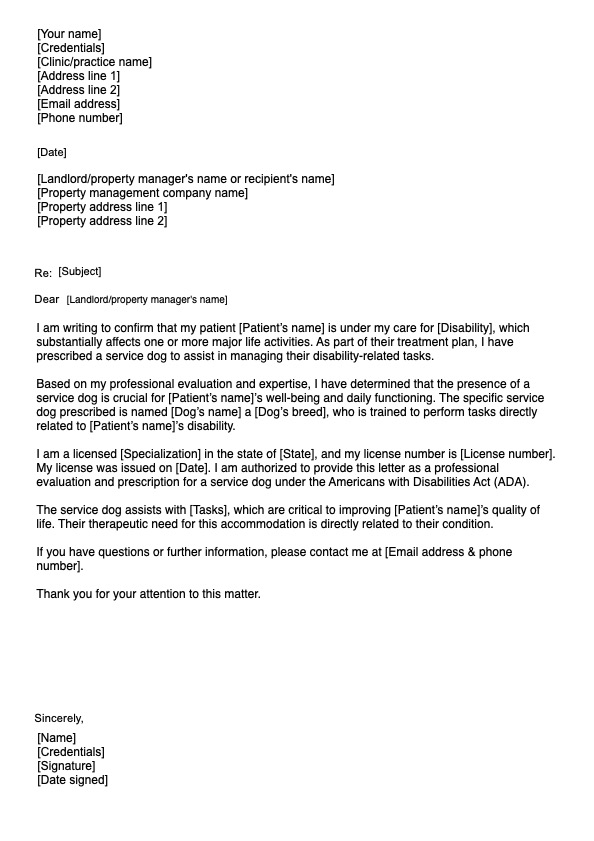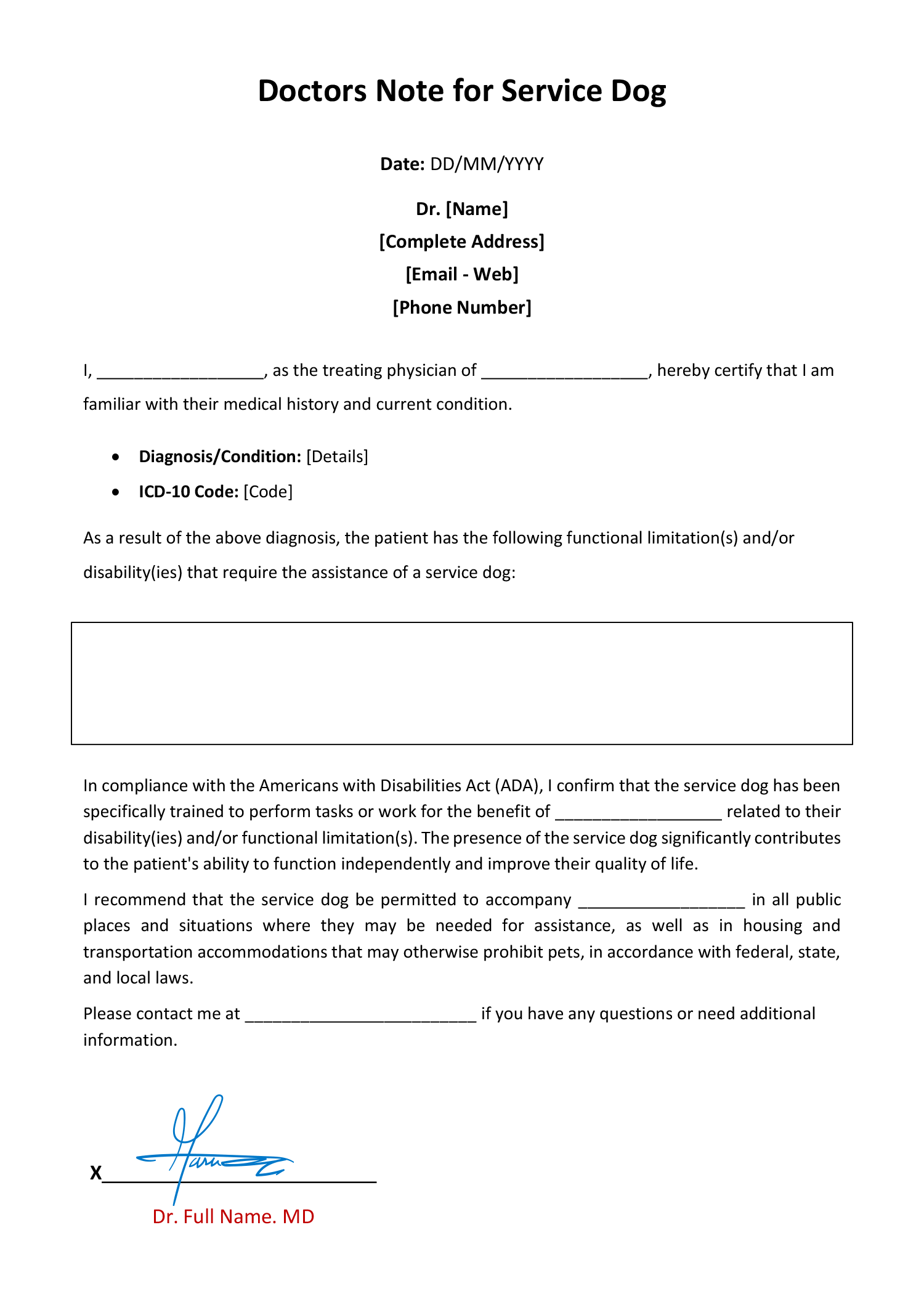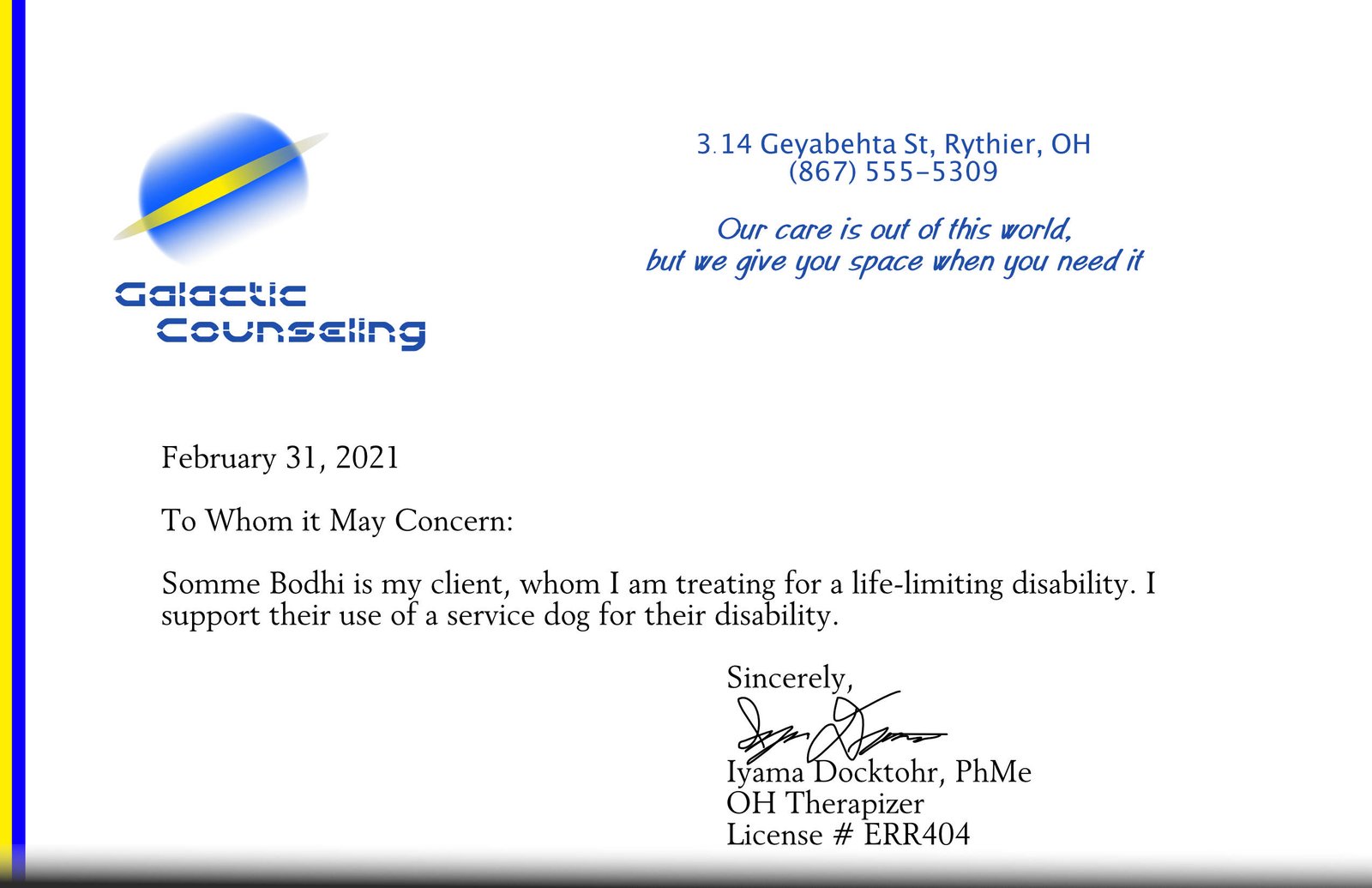Yes, you do need a doctor’s note for a service dog in many cases. This note helps show that a person has a disability and needs the support of a service animal. So let’s jump in deep: Do You Need a Doctor’s Note for a Service Dog?
Service dogs play a vital role in the lives of many individuals with disabilities. They provide assistance, companionship, and independence. However, there are rules about how to get a service dog. One key question arises: Do you need a doctor’s note?
Understanding this requirement can help you navigate the process of acquiring a service dog. This note acts as proof of your need, but the rules can vary depending on where you live. Let’s explore the reasons behind needing this documentation and what it means for you and your service dog journey.

Credit: www.carepatron.com
Table of Contents
Service Dogs Defined
Service dogs are trained to help people with disabilities. They provide support in many ways. These dogs perform specific tasks to assist their handlers. Service dogs are not pets; they have a special role in their owner’s life.
Roles And Responsibilities
Service dogs have important roles. They help their owners with daily tasks. Here are some common responsibilities:
- Guide people with vision impairments.
- Alert deaf individuals to sounds.
- Assist those with mobility challenges.
- Provide support for mental health conditions.
- Help detect medical issues, like seizures or low blood sugar.
Each service dog is trained to meet the specific needs of its owner. This training is essential for their effectiveness. Owners rely on their dogs for independence and safety.
Legal Protections
Service dogs are protected by law. The Americans with Disabilities Act (ADA) grants rights to service dog handlers. Here are some key legal protections:
| Protection | Description |
|---|---|
| Access to Public Places | Service dogs can enter all public areas. |
| Housing Rights | Landlords must allow service dogs, even with pet bans. |
| Travel Rights | Airlines must accommodate service dogs on flights. |
These laws ensure that service dog handlers receive fair treatment. It is important to understand these rights. Knowing the legal protections helps in everyday situations.
Doctor’s Note For Service Dogs
Many people wonder about the need for a doctor’s note for service dogs. This note can help show the need for a service dog. It is important to understand when it is required and what details should be included.
When Is It Required?
A doctor’s note is not always needed for service dogs. The requirements vary by state and situation. Here are some key points:
- Emotional Support Animals (ESAs): A note is often required.
- Service Dogs: Generally, no note is needed.
- Housing and Travel: Some places may ask for a note.
Check local laws. They can guide you on specific needs for a doctor’s note.
What Should It Include?
A doctor’s note should contain important information. Here are the main details to include:
- Patient’s Name: The name of the person needing the service dog.
- Diagnosis: The medical condition that requires the service dog.
- Doctor’s Information: Name, contact, and signature of the doctor.
- Duration: How long the service dog is needed.
This information helps support your need for a service dog. Always keep a copy for your records.
Navigating Ada Regulations
The Americans with Disabilities Act (ADA) guides the use of service dogs. Understanding these regulations is crucial for service dog handlers. Let’s break down the key provisions and their implications.
Key Provisions
- Definition of Service Dogs: Service dogs are trained to help individuals with disabilities. They perform specific tasks to aid their handlers.
- Public Access Rights: Service dogs can enter public places. This includes restaurants, stores, and public transportation.
- No Certification Required: The ADA does not require a doctor’s note or certification. Handlers do not need to show proof of training.
- Emotional Support Dogs: These dogs do not have the same rights. They are not considered service dogs under the ADA.
Implications For Service Dog Handlers
Service dog handlers must know their rights. They can face challenges in public spaces.
- Access Denial: Some places may try to deny access. Handlers should be prepared to explain their rights.
- Questioning: Staff can only ask two questions:
- Is the dog a service animal?
- What task has the dog been trained to perform?
- Behavior Expectations: Service dogs must behave well in public. Disruptive behavior may lead to removal.
Understanding these regulations helps handlers advocate for their rights. Knowledge empowers them to navigate public spaces confidently.
Service Dog Certification
Understanding the service dog certification process is crucial. Many people think they need a special certificate. They may also confuse it with emotional support animals. Knowing the facts can help you navigate this important area.
Myths Debunked
There are many myths about service dog certification. Here are a few common ones:
- Myth 1: Service dogs must have a certification.
- Myth 2: All service dogs wear vests or tags.
- Myth 3: You can buy a service dog certification online.
These myths can confuse owners and the public. They can lead to misunderstandings about what service dogs really are.
Truth About Certification Process
The truth is, there is no official certification for service dogs. The Americans with Disabilities Act (ADA) does not require it. Here are the key points to remember:
| Key Point | Explanation |
|---|---|
| No official certification | Service dogs do not need a formal certification. |
| Training is vital | Service dogs must be trained to assist with disabilities. |
| Legal rights | Service dogs have specific rights under the ADA. |
Individuals can train their own service dogs. Or they can use professional trainers. The focus should be on the dog’s skills and behaviors.
Remember, a doctor’s note is not needed for service dogs. The main requirement is the dog’s training to help with a disability.
Public Access Rights
Understanding the rights of service dog owners is essential. Public access rights allow service dogs to accompany their handlers in various places. Knowing these rights helps ensure a smooth experience in public settings.
Understanding Access Laws
Access laws vary by location. In the United States, the Americans with Disabilities Act (ADA) provides strong protections. Under the ADA:
- Service dogs can enter all public places.
- Handlers cannot be asked for proof of disability.
- Service dogs must be trained to perform specific tasks.
Other laws may apply in different regions. Some states have additional regulations. Always check local laws for guidance.
Handling Access Denials
Facing access denials can be frustrating. Here are steps to take if denied entry:
- Stay calm and polite.
- Explain the service dog’s role.
- Show knowledge of the ADA rights.
- Request to speak with a manager.
If denied access persists, consider these actions:
- Document the incident.
- Gather witness information.
- File a complaint with local authorities.
Knowing your rights can help protect you and your service dog.

Credit: www.servicedogcertifications.org
Traveling With A Service Dog
Traveling with a service dog can be a rewarding experience. Service dogs provide support and companionship. They also help with various tasks. Knowing the rules for travel is important. Each mode of transport has its own policies.
Air Travel
Flying with a service dog requires understanding airline policies. Most airlines allow service dogs in the cabin. You should inform the airline in advance. This helps them prepare for your arrival.
- Check the airline’s specific requirements.
- Provide any necessary documentation.
- Arrive early to avoid last-minute issues.
Some airlines may ask for a doctor’s note. This note confirms your need for a service dog. Not all airlines require it, but it’s good to have.
Be ready for security checks. Your service dog may need to go through screening. Follow all instructions from airport staff. Your dog should remain calm and well-behaved.
Accommodation Policies
Hotels and accommodations must follow the law regarding service dogs. They cannot charge extra fees for service animals. You can bring your service dog with you.
| Accommodation Type | Service Dog Policy |
|---|---|
| Hotels | Must allow service dogs. |
| Airbnb | Check individual host policies. |
| Vacation Rentals | May allow service dogs; confirm before booking. |
Always call ahead to confirm their policies. Some places may have specific rules. Providing a doctor’s note may help if they ask.
Traveling with a service dog can be smooth. Understand the rules, and prepare ahead. Enjoy your journey together.
Employment And Service Dogs
Service dogs provide important support for many people. They help individuals with disabilities perform daily tasks. Some workplaces allow service dogs to assist their handlers. Understanding your rights at work is essential.
Workplace Rights
Under the Americans with Disabilities Act (ADA), service dogs have specific rights. Employers must allow service dogs in the workplace. This applies to any area where the employee goes.
- Service dogs are not considered pets.
- Employers cannot ask for documentation in most cases.
- Service dogs must be trained to help with a disability.
Employers can ask two questions:
- Is this a service dog?
- What tasks does this dog perform?
They cannot ask for proof of training. Employers cannot demand a doctor’s note. Your right to have a service dog is protected by law.
Negotiating Accommodations
Discussing service dogs with your employer is important. Be clear about your needs. Explain how the service dog helps you.
Consider these steps:
- Prepare a list of the dog’s tasks.
- Know your rights under the ADA.
- Be ready to discuss the dog’s behavior.
Employers may have concerns. Address them calmly. Show how the service dog will fit into the workplace. This can lead to a positive outcome.

Credit: www.highfile.com
Frequently Asked Questions
Do I Need A Doctor’s Note For A Service Dog?
Yes, you typically need a doctor’s note for a service dog. This note should confirm your disability and the necessity for the service animal. However, specific regulations may vary by state or organization. Always check local laws to ensure compliance.
What Qualifies As A Service Dog?
A service dog is trained to assist individuals with disabilities. This includes physical, psychiatric, or sensory impairments. They perform tasks directly related to the handler’s disability, such as guiding the visually impaired or alerting a person with hearing loss. Emotional support animals do not qualify under this definition.
Can I Get A Service Dog Without A Diagnosis?
While it’s advisable to have a diagnosis, it’s not always mandatory. However, a doctor’s note can help establish the need for a service dog. It strengthens your case when accessing housing or public accommodations. Always consult local regulations for specific requirements.
How To Register A Service Dog?
There is no official registry for service dogs in the U. S. However, you can obtain a doctor’s note confirming the need for a service dog. Some organizations offer certification, but it is not legally required. Focus on training your dog to perform necessary tasks.
Conclusion
A doctor’s note is not always required for a service dog. Many places accept service dogs without it. However, having a note can help. It provides proof of the dog’s role. Some situations may still ask for it. Always check local laws and rules.
Understanding your rights is important. Service dogs offer support and companionship. They can improve quality of life. Know your needs and be informed. Make the best choice for you and your service dog.



